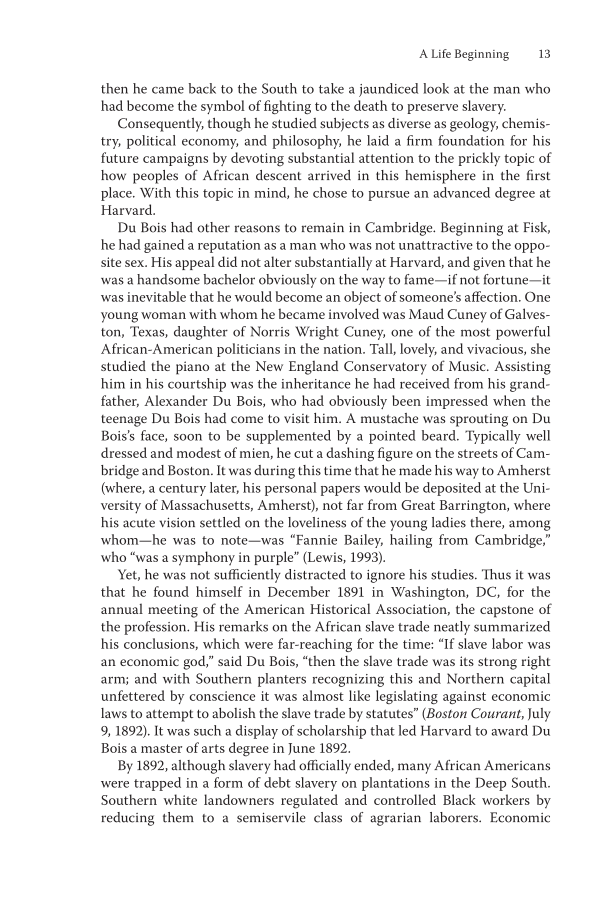A Life Beginning 13 then he came back to the South to take a jaundiced look at the man who had become the symbol of fighting to the death to preserve slavery. Consequently, though he studied subjects as diverse as geology, chemis- try, political economy, and philosophy, he laid a firm foundation for his future campaigns by devoting substantial attention to the prickly topic of how peoples of African descent arrived in this hemisphere in the first place. With this topic in mind, he chose to pursue an advanced degree at Harvard. Du Bois had other reasons to remain in Cambridge. Beginning at Fisk, he had gained a reputation as a man who was not unattractive to the oppo- site sex. His appeal did not alter substantially at Harvard, and given that he was a handsome bachelor obviously on the way to fame—if not fortune—it was inevitable that he would become an object of someone’s affection. One young woman with whom he became involved was Maud Cuney of Galves- ton, Texas, daughter of Norris Wright Cuney, one of the most powerful African-American politicians in the nation. Tall, lovely, and vivacious, she studied the piano at the New England Conservatory of Music. Assisting him in his courtship was the inheritance he had received from his grand- father, Alexander Du Bois, who had obviously been impressed when the teenage Du Bois had come to visit him. A mustache was sprouting on Du Bois’s face, soon to be supplemented by a pointed beard. Typically well dressed and modest of mien, he cut a dashing figure on the streets of Cam- bridge and Boston. It was during this time that he made his way to Amherst (where, a century later, his personal papers would be deposited at the Uni- versity of Massachusetts, Amherst), not far from Great Barrington, where his acute vision settled on the loveliness of the young ladies there, among whom—he was to note—was “Fannie Bailey, hailing from Cambridge,” who “was a symphony in purple” (Lewis, 1993). Yet, he was not sufficiently distracted to ignore his studies. Thus it was that he found himself in December 1891 in Washington, DC, for the annual meeting of the American Historical Association, the capstone of the profession. His remarks on the African slave trade neatly summarized his conclusions, which were far-reaching for the time: “If slave labor was an economic god,” said Du Bois, “then the slave trade was its strong right arm and with Southern planters recognizing this and Northern capital unfettered by conscience it was almost like legislating against economic laws to attempt to abolish the slave trade by statutes” (Boston Courant, July 9, 1892). It was such a display of scholarship that led Harvard to award Du Bois a master of arts degree in June 1892. By 1892, although slavery had officially ended, many African Americans were trapped in a form of debt slavery on plantations in the Deep South. Southern white landowners regulated and controlled Black workers by reducing them to a semiservile class of agrarian laborers. Economic
Document Details My Account Print multiple pages
Print
You have printed 0 times in the last 24 hours.
Your print count will reset on at .
You may print 0 more time(s) before then.
You may print a maximum of 0 pages at a time.














































































































































































































































































